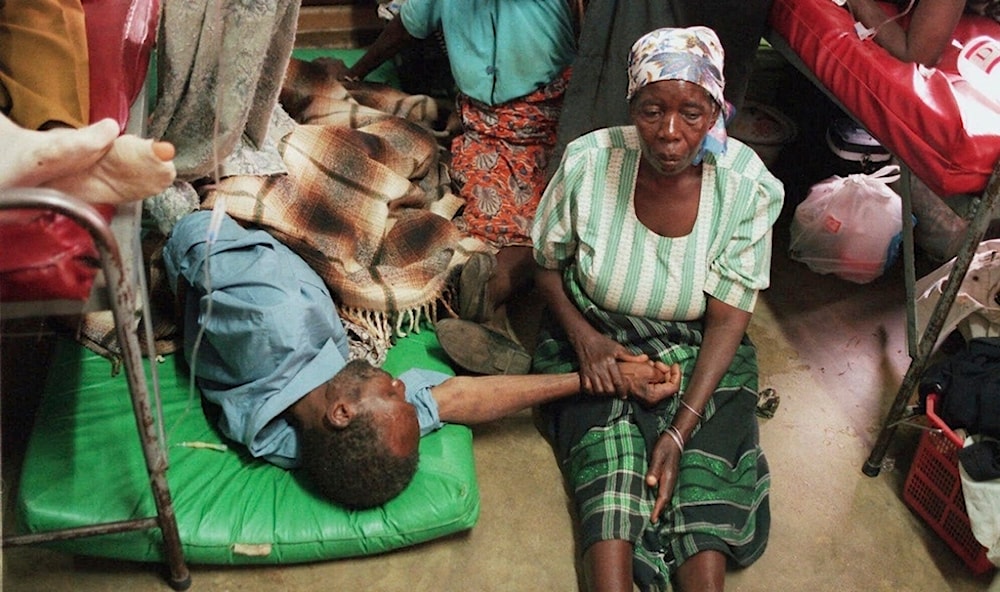Trump's aid freeze threatens millions as HIV/AIDS programs collapse
Access to lenacapavir, a new long-acting drug for HIV prevention, has been disrupted in many regions due to uncertainty over US funding.
-

FILE - A woman holds the hand of a sick relative lying on the floor of the overcrowded Lilongwe Central Hospital, in Lilongwe, Malawi, Sept. 30, 1998, as the hospital is overflowing because of an epidemic of AIDS rampaging in southern Africa. (AP Photo /Denis Farrell, File)
A decision by President Donald Trump to suspend US foreign aid could have catastrophic consequences for global HIV/AIDS programs, potentially leading to millions of additional deaths, warned Winnie Byanyima, executive director of the United Nations' AIDS program (UNAIDS), on Sunday.
The United States has long been the world's largest donor of development aid, with most assistance managed through the United States Agency for International Development (USAID). However, after returning to office in January, Trump froze most US foreign assistance for 90 days, leaving international health organizations scrambling to respond.
"It's dramatic in many countries," Byanyima told AFP. "I need to sound the alarm so that it's very clear that this is a big part (of AIDS relief funding). If it goes away, people are going to die."
Trump Targets USAID Over Allegations of Misuse
Trump's Executive Order 14169, titled "Reevaluating and Realigning United States Foreign Aid," initiated a 90-day pause on all US foreign development assistance, including HIV/AIDS relief programs, to assess their alignment with US foreign policy objectives. The move comes amid growing scrutiny of USAID, following accusations that the agency has misused funds and funneled money to terrorist groups.
In a recent House hearing, US Congressman Scott Perry claimed that USAID had inadvertently funded organizations linked to ISIS, Al-Qaeda, and Boko Haram, receiving $697 million annually. While USAID has denied these allegations, the controversy has fueled Trump's government-wide effort to cut foreign aid spending.
Read more: US Congressman drops bombshell: USAID funded terrorism
As part of this initiative, billionaire Elon Musk, who chairs Trump's Subcommittee on Delivering on Government Efficiency (DOGE), has called for dismantling USAID altogether, arguing that it misallocates US taxpayer money.
PEPFAR Suspension Puts Millions at Risk
Among the programs affected by the aid freeze is the President's Emergency Plan for AIDS Relief (PEPFAR), which provides lifesaving treatment to over 20 million people living with HIV and employs 270,000 healthcare workers worldwide.
Byanyima warned of dire consequences, stating: "We could see additional deaths increasing by tenfold" to 6.3 million in five years. "Or we could see new infections increase up to 8.7 million" in the same period.
Despite claims from the US government that "life-saving treatments" would be exempt from the freeze, healthcare workers in Africa report that clinics are already shutting down, preventing patients from accessing antiretroviral treatment (ART) and other essential services.
HIV Prevention and New Treatments in Jeopardy
The aid freeze has also stalled the rollout of crucial HIV prevention efforts. Access to lenacapavir, a new long-acting drug for HIV prevention, has been disrupted in many regions due to uncertainty over US funding. Additionally, supply chains for PrEP (pre-exposure prophylaxis)—a key HIV prevention medication—have been interrupted.
Further complicating the crisis, US Secretary of State Marco Rubio issued a waiver on January 28, exempting certain "life-saving humanitarian assistance" from the freeze. However, the waiver excludes funding for abortion services, family planning, gender initiatives, and transgender healthcare, meaning HIV prevention drugs like PrEP will only be available to pregnant and breastfeeding women, excluding LGBTQ+ communities and other high-risk groups.
African Nations Struggle to Fill the Gap
Speaking at the African Union summit in Ethiopia, Byanyima urged African leaders to transition away from reliance on foreign aid and adopt domestic financing for health services. However, she acknowledged that crippling debt burdens make this nearly impossible.
"Part of the answer is in pushing very hard for an immediate and comprehensive debt restructuring," she explained. "For many of them, debt is crowding out what could be spent on health and education."
Many African nations face debt levels exceeding 50% of their total revenue collections, leaving them unable to compensate for lost US funding.
Read more: Norwegian Refugee Council halts aid in 20 countries over US freeze
Established in 1961, USAID has been instrumental in global health efforts, with a $40 billion annual budget supporting development, humanitarian, and health programs worldwide. However, the Trump administration's decision to freeze funding—amid allegations of misuse and waste—has placed essential programs like PEPFAR at risk.
Critics argue that Trump's efforts are not aimed at eliminating USAID altogether but rather centralizing control under the State Department, further restricting how foreign aid is allocated.

 4 Min Read
4 Min Read










